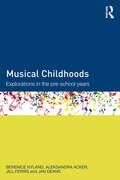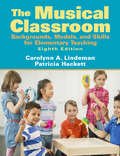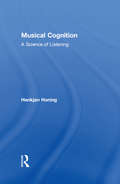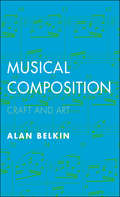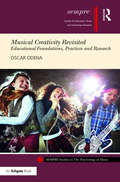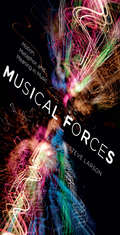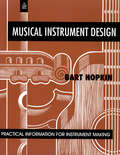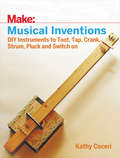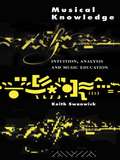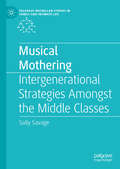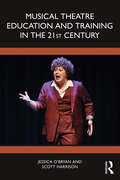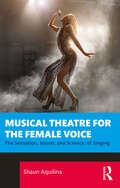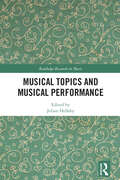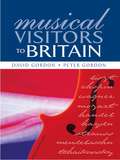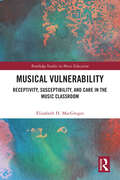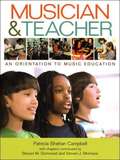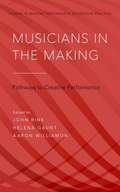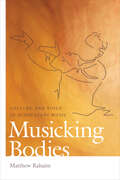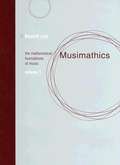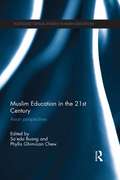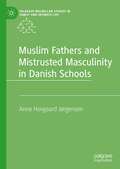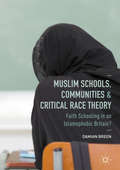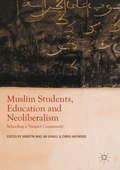- Table View
- List View
Musical Childhoods: Explorations in the pre-school years
by Jan Deans Berenice Nyland Aleksandra Acker Jill FerrisMusical Childhoods is a culmination of more than a decade of research driven by the fact that music has been neglected in early childhood programs in favour of literacy and numeracy. Recent research has identified a connection between academic performance and musical programs and this has given music a renewed status in many schools. This book promotes the idea of children’s competence in the use of the language of music and argues that all children have a right to participate in musical discovery and celebrates children’s engagement with meaningful and disparate experiences in music. Written by leading practitioners and researchers in the field, this book seeks to reaffirm children’s communicative competence when exposed to high quality musical experience, provide new perspectives on children’s ability to engage with music in many diverse forms and explore and promote the role of the musician as an artist and teacher. The book is structured into three parts: The theoretical overview The children, the musicians and the music The research through the eyes of the protagonist and looking into the future Early childhood students, researchers and academics with a specific interest in music and musicality will find this an insightful read.
Musical Classroom: Backgrounds, Models, and Skills for Elementary Teaching
by Carolynn LindemanWith this Eighth Edition, The Musical Classroom celebrates thirty years as a leading resource for future and in-service teachers as they engage children in the exciting world of music! Teachers, with the help of this user-friendly text, can develop the understandings and skills needed to teach elementary school music. The forty-four model lessons are the centerpiece to the book's long-lasting success. A collection of over 170 children's songs from around the world; instructional information for learning to play the recorder, keyboard, guitar, and Autoharp(TM); and the theoretical, pedagogical, and practical backgrounds needed for reaching all learners complete the comprehensive resource of The Musical Classroom. Note: This is the standalone book. If you want the accompanying audio CD, order the ISBN 9781138656703, which is available for separate sale.
Musical Cognition: A Science of Listening
by Henkjan HoningWhy do people attach importance to the wordless language we call music? Musical Cognition suggests that music is a game. In music, our cognitive functions such as perception, memory, attention, and expectation are challenged; yet, as listeners, we often do not realize that the listener plays an active role in reaching the awareness that makes music so exhilarating, soothing, and inspiring. In reality, the author contends, listening does not happen in the outer world of audible sound, but in the inner world of our minds and brains. Recent research in the areas of psychology and neuro-cognition allows Henkjan Honing to be explicit in a way that many of his predecessors could not. His lucid, evocative writing style guides the reader through what is known about listening to music while avoiding jargon and technical diagrams. With clear examples, the book concentrates on underappreciated musical skills-"sense of rhythm" and "relative pitch"-skills that make people musical creatures. Research on how living creatures respond to music supports the conviction that all humans have a unique, instinctive attraction to music. Everyone is musical. Musical Cognition includes a selection of intriguing examples from recent literature exploring the role that an implicit or explicit knowledge of music plays when one listens to it. The scope of the topics discussed ranges from the ability of newborns to perceive a beat, to the unexpected musical expertise of ordinary listeners. The evidence shows that music is second nature to most human beings-biologically and socially.
Musical Composition: Craft and Art
by Alan BelkinAn invaluable introduction to the art and craft of musical composition from a distinguished teacher and composerThis essential introduction to the art and craft of musical composition is designed to familiarize beginning composers with principles and techniques applicable to a broad range of musical styles, from concert pieces to film scores and video game music. The first of its kind to utilize a style-neutral approach, in addition to presenting the commonly known classical forms, this book offers invaluable general guidance on developing and connecting musical ideas, building to a climax, and other fundamental formal principles. It is designed for both classroom use and independent study.
Musical Creativity Revisited: Educational Foundations, Practices and Research (SEMPRE Studies in The Psychology of Music)
by Oscar OdenaHow is creativity understood and facilitated across music education settings? What is the power of creativity in enhancing individual and group learning? How is musical creativity used as a tool for cross-community integration? How can we research the interactions of those engaged in musical activities aimed at creative development? These are just some of the questions addressed in this fascinating new monograph. Musical Creativity Revisited is an authoritative volume of insights from theory, practice-based research and methodological analyses. Its chapters celebrate the diversity of the many different ways in which young and adult learners develop musical creativity. Following on from Musical Creativity: Insights from Music Education Research (Ashgate, 2012) Odena offers novel examples from practice and precise suggestions on how to research it. This book will be an essential point of reference for students, researchers, practitioners and practitioner-researchers interested in music education and creativity across the arts and social sciences. The chapters have been organized into three sections – Foundations, Practices and Research – including examples from in-depth studies focussed on a secondary school in England, higher music education in Spain and out-of-school settings in Northern Ireland. This is a book that will fascinate readers, inspiring them to think deeply about the many different ways in which musical creativity can be developed, its purposes and how to research it.
Musical Creativity in Restoration England
by Rebecca HerissoneMusical Creativity in Restoration England is the first comprehensive investigation of approaches to creating music in late seventeenth-century England. Understanding creativity during this period is particularly challenging because many of our basic assumptions about composition - such as concepts of originality, inspiration and genius - were not yet fully developed. In adopting a new methodology that takes into account the historical contexts in which sources were produced, Rebecca Herissone challenges current assumptions about compositional processes and offers new interpretations of the relationships between notation, performance, improvisation and musical memory. She uncovers a creative culture that was predominantly communal, and reveals several distinct approaches to composition, determined not by individuals, but by the practical function of the music. Herissone's new and original interpretations pose a fundamental challenge to our pre-conceptions about what it meant to be a composer in the seventeenth century and raise broader questions about the interpretation of early modern notation.
Musical Forces
by Steve LarsonSteve Larson drew on his 20 years of research in music theory, cognitive linguistics, experimental psychology, and artificial intelligence--as well as his skill as a jazz pianist--to show how the experience of physical motion can shape one's musical experience. Clarifying the roles of analogy, metaphor, grouping, pattern, hierarchy, and emergence in the explanation of musical meaning, Larson explained how listeners hear tonal music through the analogues of physical gravity, magnetism, and inertia. His theory of melodic expectation goes beyond prior theories in predicting complete melodic patterns. Larson elegantly demonstrated how rhythm and meter arise from, and are given meaning by, these same musical forces.
Musical Instrument Design: Practical Information for Instrument Making (Sound Design Ser.)
by Bart Hopkin John ScovilleThis is an encyclopedic, large-format book containing hundreds of illustrations. While not geared toward making conventional instruments, Musical Instrument Design provides all the information that anyone (amateur or professional) should ever need to construct an amazingly wide variety of percussion, string, and wind instruments. Includes many designs along with parts lists and detailed construction instructions.
Musical Inventions: DIY Instruments to Toot, Tap, Crank, Strum, Pluck, and Switch On
by Kathy CeceriPeople have been playing music on homemade instruments for thousands of years. But creating new instruments is much more than an art form. When you want to make a note sound higher or lower, you have to change the sound waves coming out of the instrument. That's science! When you explore the way different materials produce different sounds, that's engineering. When you speed up or slow down a song, you're counting beats -- using math. And technology makes electronic instruments and devices to record and play back music possible.
Musical Knowledge: Intuition, analysis and music education
by Keith Swanwick Prof Keith SwanwickThe understanding of music involves the mastery of its various layers of meaning. Sometimes this meaning can be acquired through human insight; at other times, it can be learned. The central concern of Musical Knowledge is the tension between intuitive and analytical ways of making sense of the world. Keith Swanwick examines this relationship on three levels: in considering music as a way of knowing; as the apparent predicament between qualitative and quantitative research paradigms; and as a tension in education. Keith Swanwick guides his reader from a theoretical exploration of musical knowledge, through an examination of ways of researching the musical experience to a concluding section which will be of direct practical help to teachers. He suggests ways in which music education can be a vital transaction, giving examples across a range of music teaching, including school classroom and instrumental studios. The book will be of interest to anyone who makes or responds to music.
Musical Mothering: Intergenerational Strategies Amongst the Middle Classes (Palgrave Macmillan Studies in Family and Intimate Life)
by Sally SavageThis book examines how gender and class discourses shape 'musical mothering' by incorporating knowledges from sociology, psychology, cultural studies, and education. Chapters detail the fundamental and functional role that mothers play in children's musical development alongside children's agency in influencing familial experiences. Music plays an essential role in the lives of mothers for themselves. Through interviews with mothers and grandmothers, as well as the author's own autobiographical reflections, the author offers a unique interdisciplinary approach to motherhood and music within Australian culture.
Musical Theatre Education and Training in the 21st Century
by Scott D. Harrison Jessica O'BryanMusical Theatre Education and Training in the 21st Century presents a wide range of viewpoints on the musical theatre profession. It brings together research from the UK, US, Australia, and beyond, providing an essential resource for educators, students, and all those involved in training for musical theatre. The research draws on best practice from creatives, producers, practising artists, and the academy to reveal a multiplicity of approaches and educational pathways for consideration by performers, educators, institutions, and the profession.The book goes beyond the key elements of performance training in singing, dancing, and acting to explore adjacent creative and business skills, along with some of the more recent and challenging aspects of the profession such as diversity of representation both on and off stage, building safe working environments, and managing mental and physical health and wellbeing. The authors incorporate information from over 100 interviews with everyone from emerging performers to leading professionals, and explore the practicalities of pre-professional training, skills development, and curricular design, alongside the broader attributes required in preparation for the profession. This book offers vital insights into how musical theatre practitioners can best be prepared to make their way in the field now and in the future.
Musical Theatre for the Female Voice: The Sensation, Sound, and Science, of Singing
by Shaun AquilinaFemale musical theatre singers produce some of the most exciting and expressive singing an audience can experience. They also face a unique and specific set of issues when approaching their craft, from negotiating the registers of their voice to enable them to belt, to vocal health challenges such as premenstrual voice syndrome. This is the only book that offers a full and detailed guide to tackling those issues and to singing with full expression and technical excellence. Musical Theatre for the Female Voice covers the origin of singing in musicals, from the bel canto style of 300 years ago through to the latest developments in high belting, in shows such as Wicked and Waitress. It offers the reader exercises and methods that have been used to train hundreds of singers at some of the UK’s leading musical theatre training institutions and are underpinned by the latest academic research in journals on singing, psychology, and health. Every element of a singer's toolkit is covered from a female perspective, from breath and posture to character work and vocal health. This is an essential guidebook for female singers in musical theatre productions, either training at university or conservatory level or forging a career as professional triple-threat performers.
Musical Topics and Musical Performance (Routledge Research in Music)
by Julian HellabyThe principal purpose of topics in musicology has been to identify meaning-bearing units within a musical composition that would have been understood by contemporary audiences and therefore also by later receivers, albeit in a different context and with a need for historically aware listening. Since Leonard Ratner (1980) introduced the idea of topics, his relatively simple ideas have been expanded and developed by a number of distinguished authors. Topic theory has now become a well-established branch of musicology, often embracing semiotics, but its relationship to performance has received less attention. Musical Topics and Musical Performance thus focuses on the interface of theory and practice, and investigates how an appreciation of topical presence in a work may prompt interpretative thoughts for a potential performer as well as how performers have responded to such a presence in practice. The chapters focus on music from the nineteenth, twentieth and twenty-first centuries with case studies drawn from composers as diverse as Beethoven, Scriabin and Péter Eötvös. Using both scores and recordings, the book presents a variety of original and innovative perspectives on the subject from a range of distinguished authors, and addresses a neglected area of musicology and musical performance.
Musical Topics and Musical Performance (Routledge Research in Music)
by Julian HellabyThe principal purpose of topics in musicology has been to identify meaning-bearing units within a musical composition that would have been understood by contemporary audiences and therefore also by later receivers, albeit in a different context and with a need for historically aware listening. Since Leonard Ratner (1980) introduced the idea of topics, his relatively simple ideas have been expanded and developed by a number of distinguished authors. Topic theory has now become a well-established branch of musicology, often embracing semiotics, but its relationship to performance has received less attention. Musical Topics and Musical Performance thus focuses on the interface of theory and practice, and investigates how an appreciation of topical presence in a work may prompt interpretative thoughts for a potential performer as well as how performers have responded to such a presence in practice. The chapters focus on music from the nineteenth, twentieth and twenty-first centuries with case studies drawn from composers as diverse as Beethoven, Scriabin and Péter Eötvös. Using both scores and recordings, the book presents a variety of original and innovative perspectives on the subject from a range of distinguished authors, and addresses a neglected area of musicology and musical performance.
Musical Visitors to Britain (Woburn Education Series)
by Peter GordonBritain has attracted many musical visitors to its shores. A varied and often eccentric collection of individuals, some were invited by royalty with musical tastes, some were refugees from religious or political oppression, some were spies, and others came to escape debt or even charges of murder. This book paints a broad picture of the changing nature of musical life in Britain over the centuries, through the eyes and ears of foreign musicians. After considering three of the eighteenth century’s greatest musical figures, the authors consider the rise of the celebrity composer in the nineteenth century, and go on to consider the influence of new forms of transport which allowed travel more freely from the Continent and the USA. Musical Visitors to Britain also charts the new opportunities presented by the opening of public halls, the growth of music festivals, and the regular influx of composers in the twentieth and twenty-first centuries, ending with the impact of new musical forms such as jazz. As much a social as a musical history of Britain, this book will be of interest to anyone studying or working in these fields, as well as to general readers who want to discover more about our musical heritage.
Musical Vulnerability: Receptivity, Susceptibility, and Care in the Music Classroom (Routledge Studies in Music Education)
by Elizabeth H. MacGregorSince the early twenty- first century, music education across the world has been shaped by neoliberal discourse extolling the benefits of music upon academic achievement, health and wellbeing, and social development. However, such benefits are far from universal; on the contrary, music- making often reveals our shortcomings and dependencies. This highlights an urgent need for music education to be reframed by an understanding of ‘musical vulnerability’: our inherent and situational openness to being affected by the semantic and somatic properties of music- making.Drawing on existing vulnerability studies, this book evaluates how musicmaking can foster both positive receptivity and negative susceptibility, depending on its delineation of self- identity, social identity, and space, and its embodiment through aural receptivity, mimetic participation, and affective transmission. Through phenomenological, ethnographic research with teachers and pupils, it exposes how values espoused in the music classroom require the personal and interpersonal negotiation of conflicting musical expectations, identities, and abilities. It makes recommendations for music education policymakers, teachers, and researchers in diverse global contexts, suggesting the importance of developing ‘pedagogies of vulnerability’ in order to foster caring classroom music- making praxes that acknowledge music’s capacity both to heal and to harm.
Musician and Teacher: An Orientation to Music Education
by Patricia Shehan Campbell Steven M. Demorest Steven J. MorrisonDesigned for the first course in music education, Musician & Teacher surveys the theoretical, philosophical, historical, social, and psychological foundations of teaching music and pays tribute to the local and global realms of music teaching and learning. At the same time, the book examines the developmental issues inherent in teaching music to children and adolescents along with the practicalities of motivating students and managing a classroom, providing the concrete application beginning educators need to successfully teach music to children in grades K-12.
Musicians in the Making: Pathways to Creative Performance (Studies In Musical Performance As Creative Practice Series)
by John Rink Helena Gaunt Aaron WilliamonThis book explores the creative development of musicians in both formal and informal learning contexts. It promotes a novel view of creativity, emphasizing its location within creative processes rather than understanding it as an innate quality. It argues that such processes may be learned and refined, and furthermore that collaboration and interaction within group contexts carry significant potential to inform and catalyze creative experiences and outcomes. The book also traces and models the ways in which creative processes evolve over time. Performers, music teachers and researchers will find the rich body of material assembled here engaging and enlightening. The book's three parts focus in turn on 'Creative learning in context', 'Creative processes' and 'Creative dialogue and reflection'. In addition to sixteen extended chapters written by leading experts in the field, the volume includes ten 'Insights' by internationally prominent performers, performance teachers and others. Practical aids include abstracts and lists of keywords at the start of each chapter, which provide useful overviews and guidance on content. Topics addressed by individual authors include intrapersonal and interpersonal dynamics, performance experience, practice and rehearsal, 'self-regulated performing', improvisation, self-reflection, expression, interactions between performers and audiences, assessment, and the role of academic study in performers' development.
Musicking Bodies: Gesture and Voice in Hindustani Music (Music Culture)
by Matthew RahaimIndian vocalists trace intricate shapes with their hands while improvising melody. Although every vocalist has an idiosyncratic gestural style, students inherit ways of shaping melodic space from their teachers, and the motion of the hand and voice are always intimately connected. Though observers of Indian classical music have long commented on these gestures, Musicking Bodies is the first extended study of what singers actually do with their hands and voices. Matthew Rahaim draws on years of vocal training, ethnography, and close analysis to demonstrate the ways in which hand gesture is used alongside vocalization to manifest melody as dynamic, three-dimensional shapes. The gestures that are improvised alongside vocal improvisation embody a special kind of melodic knowledge passed down tacitly through lineages of teachers and students who not only sound similar, but who also engage with music kinesthetically according to similar aesthetic and ethical ideals. Musicking Bodies builds on the insights of phenomenology, Indian and Western music theory, and cultural studies to illuminate not only the performance of gesture, but its implications for the transmission of culture, the conception of melody, and the very nature of the musicking body.
Musimathics: The Mathematical Foundations of Music, Volume 1
by Gareth LoyMathematics can be as effortless as humming a tune, if you know the tune, writes Gareth Loy. In Musimathics, Loy teaches us the tune, providing a friendly and spirited tour of the mathematics of music--a commonsense, self-contained introduction for the nonspecialist reader. It is designed for musicians who find their art increasingly mediated by technology, and for anyone who is interested in the intersection of art and science. In this volume, Loy presents the materials of music (notes, intervals, and scales); the physical properties of music (frequency, amplitude, duration, and timbre); the perception of music and sound (how we hear); and music composition. Musimathics is carefully structured so that new topics depend strictly on topics already presented, carrying the reader progressively from basic subjects to more advanced ones. Cross-references point to related topics and an extensive glossary defines commonly used terms. The book explains the mathematics and physics of music for the reader whose mathematics may not have gone beyond the early undergraduate level. Calling himself "a composer seduced into mathematics," Loy provides answers to foundational questions about the mathematics of music accessibly yet rigorously. The topics are all subjects that contemporary composers, musicians, and musical engineers have found to be important. The examples given are all practical problems in music and audio. The level of scholarship and the pedagogical approach also make Musimathics ideal for classroom use. Additional material can be found at a companion web site.
Muslim Education in the 21st Century: Asian perspectives (Routledge Critical Studies in Asian Education)
by Phyllis Ghim-Lian Chew Sa'Eda BuangMuslim Education in the 21st Century reinvestigates the current state of affairs in Muslim education in Asia whilst at the same time paying special attention to Muslim schools’ perception of educational changes and the reasons for such changes. It highlights and explores the important question of whether the Muslim school has been reinventing itself in the field of pedagogy and curriculum to meet the challenges of the 21st century education. It interrogates the schools whose curriculum content carry mostly the subject of religion and Islam as its school culture. Typologically, these include state-owned or privately-run madrasah or dayah in Aceh, Indonesia; pondok, traditional Muslim schools largely prevalent in the East Malaysian states and Indonesia; pesantren, Muslim boarding schools commonly found in Indonesia; imam-khatip schools in Turkey, and other variations in Asia. Contributed by a host of international experts, Muslim Education in the 21st Century focuses on how Muslim educators strive to deal with the educational contingencies of their times and on Muslim schools’ perception of educational changes and reasons for such changes. It will be of great interest to anyone interested in Asian and Muslim education.
Muslim Fathers and Mistrusted Masculinity in Danish Schools (Palgrave Macmillan Studies in Family and Intimate Life)
by Anne Hovgaard JørgensenThis book seeks to provide a deeper understanding of Muslim migrant fathers’ experiences of home-school cooperation in Danish schools by identifying and contradicting a phenomenon of “mistrusted masculinity.” This term refers to a negative stereotype of Muslim migrant men that figures in political and media rhetoric where they are portrayed as controlling and patriarchal. Throughout the ethnography, migrant fathers confront this stereotype and express how they must navigate around this negative image in their struggle to be acknowledged as good fathers by their children’s schools. Jørgensen uses Geertzian “thick description” of micro-interaction between fathers and Danish teachers to explore the complex interplay of often-untested assumptions, misunderstandings, and untoward effects.
Muslim Schools, Communities and Critical Race Theory
by Damian BreenThis book explores the position of Muslim schools in contemporary Britain. A Critical Race Theory approach is used to consider some of the specific issues faced by Muslim schools, in particular those looking to become state-funded. The book provides a critically considered and meaningful application of a theory of 'race' to Muslims as a religious community, without restricting the analysis to minority ethnic Muslim groups; it also provides a counter-narrative which contests assumptions about Muslim schools presented in the media and in public debates more generally. These insights are positioned against current political climates within which Muslims have been consistently subjected to surveillance and suspicion. The book draws on first-hand research carried out inside Muslim schools to offer insights into the ways that these schools cater to diverse and locally-specific needs. It concludes by arguing that independent Islamic schools represent ideal models of community need. Therefore, bringing such schools into the state sector, in a way that allows them to retain autonomy, represents an ideal strategy for the educational and political enfranchisement of British Muslims. Muslim schooling represents an opportunity for increased state investment in Muslim interests as a strategy for offsetting the ways in which Muslim communities have been marginalised more generally in contemporary political climates. The book will make compelling reading for students and researchers in the fields of Education, Sociology, and Religious Studies, particularly those with an interest in faith schools, Islam, and Critical Race Theory.
Muslim Students, Education and Neoliberalism
by Chris Haywood Máirtín Mac an GhaillThis edited collection brings together international leading scholars to explore why the education of Muslim students is globally associated with radicalisation, extremism and securitisation. The chapters address a wide range of topics, including neoliberal education policy and globalization; faith-based communities and Islamophobia; social mobility and inequality; securitisation and counter terrorism; and shifting youth representations. Educational sectors from a wide range of national settings are discussed, including the US, China, Turkey, Canada, Germany and the UK; this international focus enables comparative insights into emerging identities and subjectivities among young Muslim men and women across different educational institutions, and introduces the reader to the global diversity of a new generation of Muslim students who are creatively engaging with a rapidly changing twenty-first century education system. The book will appeal to those with an interest in race/ethnicity, Islamophobia, faith and multiculturalism, identity, and broader questions of education and social and global change.
